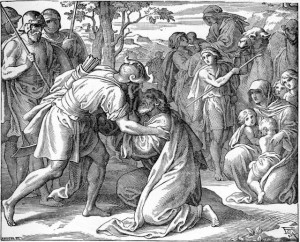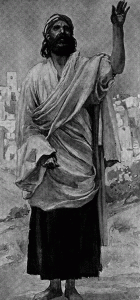Genesis 32 is the story of Jacob’s return to Canaan after having been exiled from his homeland for 20 years. This is often referred to as Jacob’s Trouble (from Jer 30:7). His exile occurred after he obtained his divinely promised birthright through shrewd if not unscrupulous means from his brother Esau resulting in his having to flee Canaan for fear of his life due to Esau’s vengeance. Jacob found refuge in the region of Babylonia at his Uncle Laban’s home where he married Laban’s two daughters, Leah and Rachel. Genesis 32 recounts Jacob’s encounter with Esau who, along with his small army, physically stood in Jacob’s way from entering the land of his promised inheritance—later to be known as the land of Israel or Promised Land.
The Jewish sages believe that this encounter between Jacob and Esau is prophetic in nature and will happen again in the end times, but this time on a much larger scale and this time involving the numerous descendants of Israel and Esau. The Israelites will be attempting to return to their ancestral homeland, while the descendants of Esau will be attempting to block their way. As we proceed in this study, we will see whether this prophecy is beginning to come to pass in our days.
Rolling the film backwards a little, Laban had chased Jacob out of the area of Babylon, and yet Jacob was being blocked from entering Canaan by Esau (or Edom meaning “red”). This is reminiscent of Pharaoh chasing the Israelites out of Egypt only to find themselves blocked by the Red Sea, which is a picture of Edom (meaning “red”). In both instances, YHVH’s people were forced to totally rely on him for deliverance from their enemies who were before and behind them.
Chapter 32 is a study in how we often deal with major trials and stressful situations in life. Jacob (a) was gripped by fear, (b) resorted to fleshly schemes to appease his brother’s wrath and “to save his own hide” and that of his family, and (c) at the same time he Continue reading







